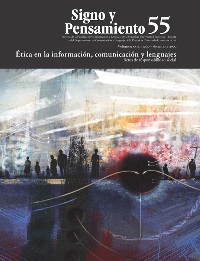Abstract
By examining the concept of human dignity, on which human rights are basically acknowledged, we discuss issues both directly and indirectly related to social communications in the Declaration of the Rights of Man. In this context, we then discuss the relation established between ethics and communications, taking ethic purpose or intent as a point of reference, and then proceed to examine in more detail the concept of social justice, which in turn implies the notion of participatory equity. In the latter, we find the heart of the relationship between ethics and communications, understood as a relationship in which everyone is recognized as an interlocutor with the right to express him/her-self from his/her own social and cultural identity.
Kant, I. (1996), Fundamentación de la metafísica de las costumbres, traducción de José Mardomingo, Barcelona, Ariel.
McBride, S. et al. (1980), Un sólo mundo, voces múltiples [informe de la Comisión McBride y propuesta del NOMIC], París, UNESCO.
Neef, M. et al. (1986), Desarrollo a escala humana, Santiago de Chile, CEPAUR.
Organización de las Naciones Unidas (ONU) (1948), “Artículo 19”, Declaración Universal de los Derechos Humanos, Ginebra, ONU.
— (1966), Pacto Internacional de Derechos Civiles y Políticos, Ginebra, ONU.
Pasquali, A. (1979), “Ética en las comunicaciones”, Comprender la comunicación, Caracas, Monte Ávila Editores.
Raphael, D. D. (1987), Filosofía moral, traducción de Juan José Utrilla, México, Fondo de Cultura Económica.
— (1981), Moral Philosophy, Oxford, Oxford University Press, Oxford, 1981.
Rawls, J. (1979), Teoría de la justicia, traducción de María Dolores González, México, Fondo de Cultura Económica.
— (1971), A Theory of Justice, Cambridge, Harvard University Press. Ricoeur, P. (1996), Sí mismo como otro, MéxicoMadrid, Siglo XXI.
— (1990), Soi même comme un autre, París, Editions du Seuil.
Rivers, W. y Schramm, W. (1957), Responsibility in Mass Communication, Nueva York, Harper & Row.
Ronderos, M. T. e Iriarte, P. (1999), Manual para cubrir la guerra y la paz [conferencia episcopal de Alemania], Bogotá, Pontificia Universidad Javeriana, Fundación Friedrich Ebert de Colombia (FESCOL), Embajada de Alemania, Fundación para un Nuevo Periodismo Iberoamericano.
Taylor, C. (1995), Philosophical Arguments, Cambridge, Harvard University Press.
This journal is registered under a Creative Commons Attribution 4.0 International Public License. Thus, this work may be reproduced, distributed, and publicly shared in digital format, as long as the names of the authors and Pontificia Universidad Javeriana are acknowledged. Others are allowed to quote, adapt, transform, auto-archive, republish, and create based on this material, for any purpose (even commercial ones), provided the authorship is duly acknowledged, a link to the original work is provided, and it is specified if changes have been made. Pontificia Universidad Javeriana does not hold the rights of published works and the authors are solely responsible for the contents of their works; they keep the moral, intellectual, privacy, and publicity rights.
Approving the intervention of the work (review, copy-editing, translation, layout) and the following outreach, are granted through an use license and not through an assignment of rights. This means the journal and Pontificia Universidad Javeriana cannot be held responsible for any ethical malpractice by the authors. As a consequence of the protection granted by the use license, the journal is not required to publish recantations or modify information already published, unless the errata stems from the editorial management process. Publishing contents in this journal does not generate royalties for contributors.


